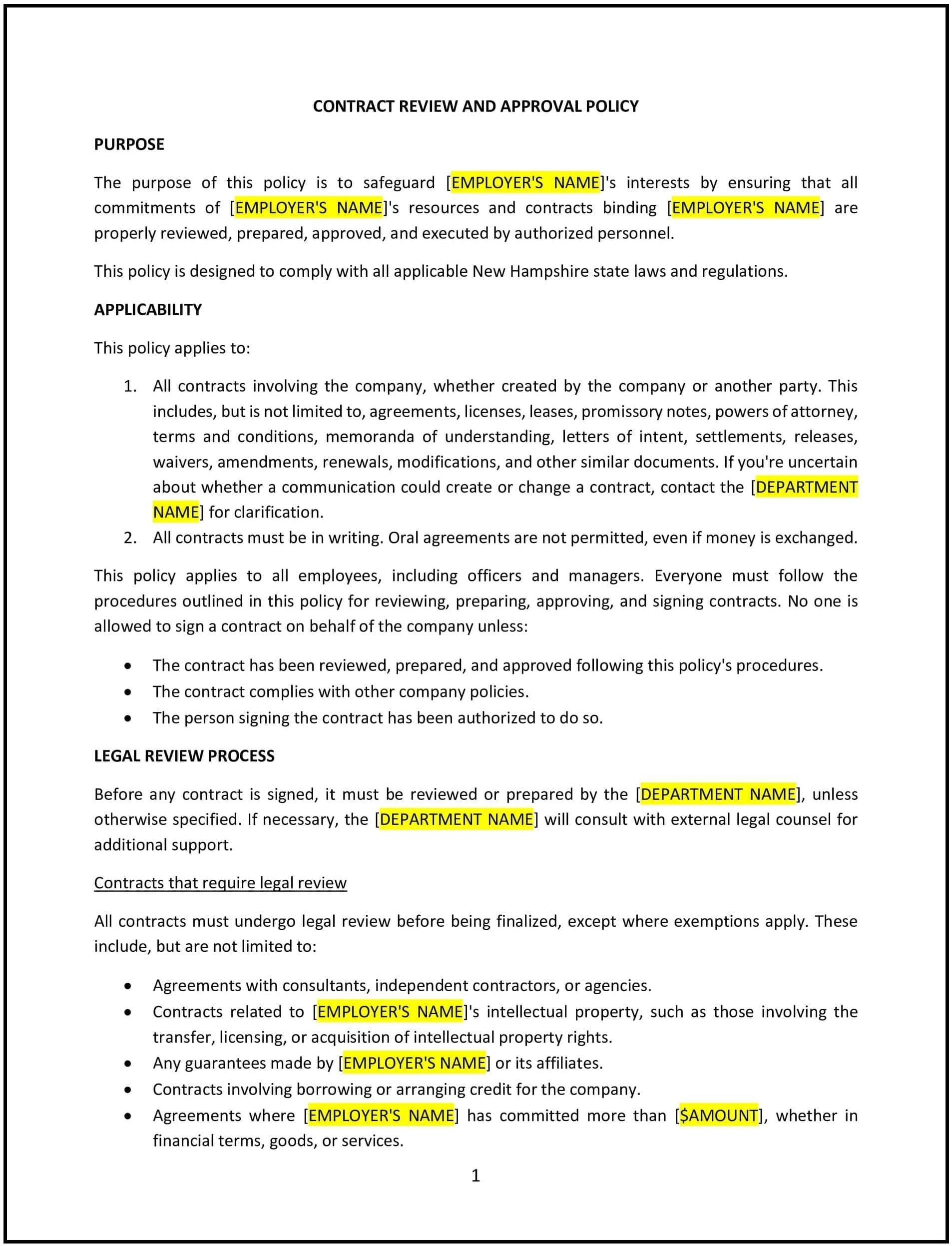Contract review and approval policy (New Hampshire): Free template
Got contracts to review? While you're here for policies, let Cobrief make contract review effortless—start your free review now.

Customize this template for free
Contract review and approval policy (New Hampshire)
A contract review and approval policy helps New Hampshire businesses streamline the process for reviewing, approving, and executing contracts. This policy defines the steps involved in reviewing and finalizing contracts, the roles and responsibilities of various stakeholders, and how to ensure that contracts align with company objectives and legal requirements.
By adopting this policy, businesses in New Hampshire can mitigate risks, improve efficiency, and maintain clear guidelines for contract management.
How to use this contract review and approval policy (New Hampshire)
- Define contract types: Specify the types of contracts that require review and approval, such as vendor agreements, employee contracts, partnership agreements, and leases.
- Establish review procedures: Outline the steps for reviewing contracts, including who is responsible for reviewing each contract (e.g., legal, finance, department heads) and what aspects need to be considered (e.g., terms, conditions, risks).
- Set approval levels: Clarify the approval levels for different types of contracts, based on factors like contract value, complexity, and risk. Define who is authorized to approve each type of contract and the process for escalating approval requests.
- Protect confidentiality: Ensure that all contract details, especially sensitive or proprietary information, are handled confidentially throughout the review and approval process.
- Address timelines: Set clear timelines for reviewing and approving contracts, ensuring that contracts are reviewed and signed in a timely manner to avoid delays in business operations.
- Standardize contract templates: Provide standardized contract templates or clauses to streamline the review process and maintain consistency across contracts.
- Monitor contract compliance: Implement a process for monitoring and enforcing the terms of approved contracts, including tracking deadlines, deliverables, and compliance with terms.
- Review and update: Regularly review the policy to ensure it aligns with New Hampshire regulations and the company’s evolving needs and best practices.
Benefits of using this contract review and approval policy (New Hampshire)
This policy provides several benefits for New Hampshire businesses:
- Reduces legal and financial risks: By formalizing the review and approval process, businesses can minimize the risks of entering into unfavorable or legally non-compliant contracts.
- Streamlines workflows: Clearly defined procedures and roles help ensure that contracts are reviewed and approved efficiently, reducing delays and administrative burden.
- Increases accountability: By assigning specific roles for contract review and approval, businesses can track responsibility and ensure that all necessary approvals are obtained.
- Improves consistency: Using standardized templates and approval processes helps maintain consistency across contracts, ensuring uniformity in terms and conditions.
- Enhances contract management: By setting up a system for tracking and enforcing contract compliance, businesses can better manage ongoing contractual relationships and obligations.
Tips for using this contract review and approval policy (New Hampshire)
- Communicate the policy clearly: Ensure that all employees involved in the contract review and approval process understand the policy, their responsibilities, and the timeline for completion.
- Use standardized templates: Provide standard contract templates to streamline the review process and ensure that terms are consistent across similar agreements.
- Involve key stakeholders: Ensure that relevant departments (e.g., legal, finance, operations) are involved in the review and approval process to address all potential risks and considerations.
- Keep records: Maintain accurate records of all contracts reviewed and approved, including any modifications or amendments, to ensure compliance and transparency.
- Review the policy regularly: Update the policy as needed to reflect changes in New Hampshire state laws, business practices, or company operations.